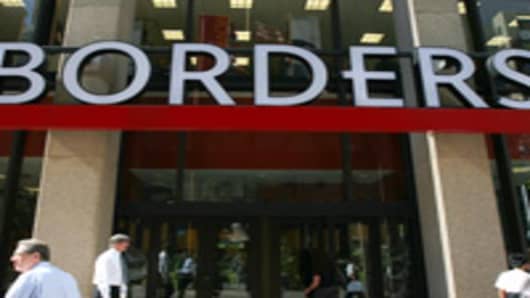Borders began holding talks with publishers on Tuesday, seeking to convert delayed payments into interest-bearing debt as part of a plan to refinance its debt, according to people briefed on the matter.
Borders has been in talks with lenders, including GE Capital and Jefferies, to refinance its existing bank loans from a group led by Bank of America, these people said. Bank of America and GE Capital were two of the lenders that provided the company with as much as $970.5 million in financing through a revolving credit deal last year.
One of the requirements attached to the potential refinancing is to persuade enough publishers to agree to deferred payments. To that end, Borders has been setting up meetings with publishers in New York this week. Such talks are always delicate, given the company’s dependence on receiving new shipments of books.
Mary Davis, a spokeswoman for Borders, said in a statement that company executives continued to work on reorganizing its financing, including agreements with publishers.
“Borders has notified these vendors and will be working with them to restructure their arrangements with the company,” she said.
Spokesmen for GE Capital and Jefferies declined to comment.
Shares of Borders tumbled 12.5 percent on Tuesdayto 84 cents. They have fallen more than 34 percent over the last 12 months.
The company has struggled for years with declining sales of printed books, as digital books have grown more popular. The most recent effect of those struggles grew apparent on Monday, as Borders disclosed the resignation of Thomas D. Carney, its general counsel, and Scott Laverty, its chief information officer.
While the company is not in a liquidity crisis, Borders has reported before that not being able to refinance its loans could put it in violation of existing requirements on debt this quarter.
Even if Borders should obtain its refinancing, it remains to be seen how it will rebuild its business model.
Several publishers said Borders owed them millions of dollars in payments, up to tens of millions each for the larger publishers. Publishers said they had been told by Borders executives that more than two dozen vendors were owed money.
Some publishers said they were shipping books to Borders cautiously, or not at all, and reconsidering the number of new books to print. A spokesman for the Ingram Book Company, Keel Hunt, said Ingram, a wholesaler, was still sending books to Borders on Tuesday.
Concessions by publishers to Borders could irritate the company’s larger rival, Barnes & Noble.
“We think the playing field should be even,” Mary Ellen Keating, a Barnes & Noble spokeswoman, said in an e-mailed statement. “We expect publishers to offer the same terms to all other booksellers, including Barnes & Noble and independent booksellers.“
It is not clear whether Borders must also receive additional capital from its biggest equity investors, its chairman and chief executive, Bennett S. LeBow, and William A. Ackman’s hedge fund, Pershing Square Capital Management.
A spokeswoman for Pershing declined to comment.
Mr. LeBow, a longtime financier, became Borders’s chairman last spring after investing $25 million in the company.
Mr. Ackman offered last month to provide up to $960 million to finance a mergerof Borders and Barnes & Noble, although he has said nothing publicly about investing more money into Borders. The hedge fund has been one of the largest shareholders in Borders in recent years, owning about a 37 percent stake through its holdings of common stock and warrants. It previously lent the bookseller $42.5 million, a loan that was repaid last year.
Barnes & Noble is unlikely to favor a merger with its smaller riva, which would sharply increase its store count, according to people close to the company. Instead, it will most likely focus on its digital strategy, which centers largely on its Nook e-reader.


